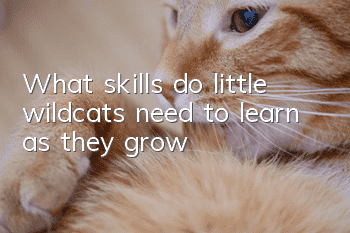What skills do little wildcats need to learn as they grow?

Natural selection and survival of the fittest. In the process of growth, we must constantly optimize ourselves so that we can adapt to society more quickly and adapt to this rhythm. Survival of the fittest is an eternal truth. In fact, not only people need this, Kittens also need to learn some skills as they grow, so that they will not starve to death on the road to growth. Of course, most of these skills are learned by little wild cats.
1. The growth pattern of kittens
Kittens weigh about 100 grams at birth and will double their weight in about two weeks. Kittens under two weeks old have a normal heartbeat of more than 200 times per minute and a breathing rate of about 15 to 35 times per minute. The body temperature of newborn kittens is relatively low, about 35-36°C, and will slowly rise within 1-2 weeks after birth, until it reaches about 37.7°C when they are four weeks old.
Kittens can feel pain when they are just born, but the neuromuscular reflexes related to pain will not be fully developed until they are 7 days old. The eyes will open between 5 and 14 days after birth. At this time, the iris appears grey-blue, which is the so-called grey-blue eyeball. In the next few weeks, the eyes will slowly change to the color that the adult cat will have, but kittens will not have enough normal vision until about 3 to 4 weeks old. From the 7th to 14th day of age, the baby will slowly start to crawl. On the 16th day, it will begin to waddle and learn to walk. By the 21st day, the steps will become more mature and steady.
Cats usually cannot walk steadily until the third week. Before that, they can only rely on the mother cat to move them. Cats will have their first set of teeth when they are 2 weeks old, and by three weeks they can basically go to the toilet on their own. Cats at this time will also start to play. Cats that are four weeks old will bite and play with each other, and they will also learn how not to hurt each other. In the fifth week, kittens begin to wean, begin to eat solid food, and become independent. At this time, the cat's sense of balance has been fully developed and it also knows how to groom. This period is a learning stage for cats, where they must learn to understand themselves and other animals.
After a cat is two months old, its muscles are fully developed, but it still needs a lot of exercise to accurately judge distance, height and speed. The skills of hunting were also learned during this period. Generally speaking, it is best for kittens to leave their mothers after they are three months old, because when they are three months old, cats have a sense of territory and a good sense of direction.
2. What skills do kittens need to learn as they grow up
1. Learn to hunt
When the kittens reach 3 weeks old, the mother cat, who is allowed outside by the owner, begins to bring the prey back to the nest. At first, the mother cat brought the dead prey back and ate it in front of the kittens. Later, it will leave the dead prey for its children to eat. Eventually, it will bring back the live prey and let the kittens kill it. It does not directly teach kittens how to kill hunters.animal, but stay with the kitten in case the unlucky victim escapes. If kittens are to fend for themselves in the future, they must learn to hunt and how to handle prey. Interestingly, kittens, whether aggressive or friendly, learn faster from their own mother's example than from observing other unrelated adult cats.
2. Learn to play
Like other young carnivores, kittens love to play. Play plays a substantial role in helping kittens learn how to live independently when they grow up. Kittens practice attack and defense, and train techniques such as attack, pursuit, ambush, and killing, but they never carry things too far or cause harm to their companions. When kittens play, there is an air of exaggeration, excitement and courage. This clearly shows that they think the game itself is fun. Games also help kittens develop group awareness. Kittens who cannot play with other partners during their growth and development stages will become withdrawn cats as adults, and sometimes become cats that are not interested in the opposite sex.
3. Learn to have fun
If your kitten seems to be fighting, don't panic. Usually it's just a joke. In fact, this kind of simulated battle is very meaningful, because kittens can learn how to attack and how to defend themselves.
3. The owner should prepare toys for the kitten
1. Kitten’s toys
Although pet stores do sell toys specifically designed for cats, kittens are very curious and will quickly discover that items at home, such as a ball of wool, are also very interesting.
2. Provide a safe environment
Kittens like to crawl into baskets, boxes, and other items with holes to explore, so be sure to place items that your kitten might crawl into properly.
If a cat is brought home and raised when he is very young, he usually will not have some hunting skills, because this is a learning process, not instinctive, so not all cats will learn hunting skills.
- How do you know if the cat vaccine is successful?
- Can cat vaccination and deworming be done at the same time? Can cat vaccination and deworming be done at the same time?
- How to stop a cat from meowing in a cage
- How to artificially feed kittens
- What should a cat eat when he is sick? Give it a change of taste
- Treatment of feline seborrheic dermatitis
- Why are cats afraid of soft nests?
- What's the reason for kittens to be annoying?
- Why do German Curl cats need to be neutered?
- Can 2-month-old kittens eat meat?



